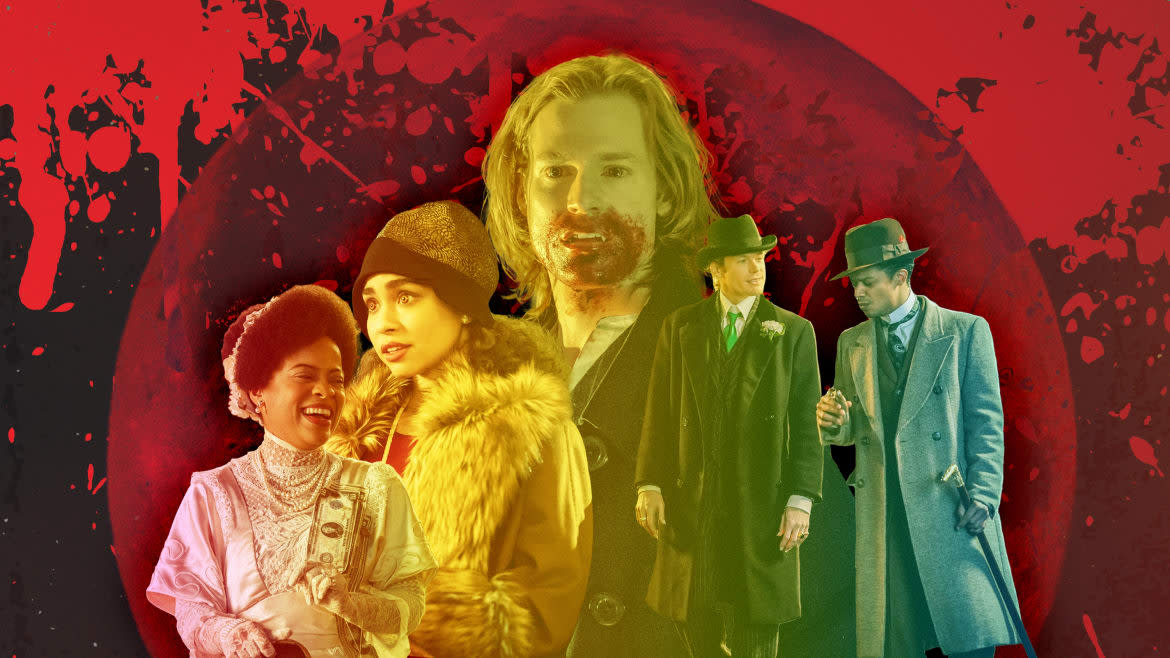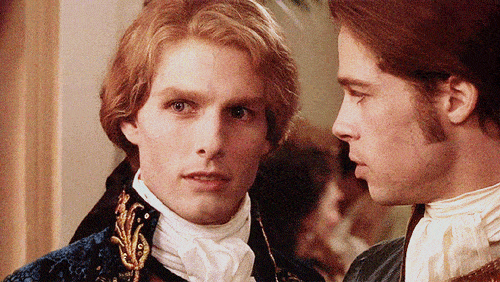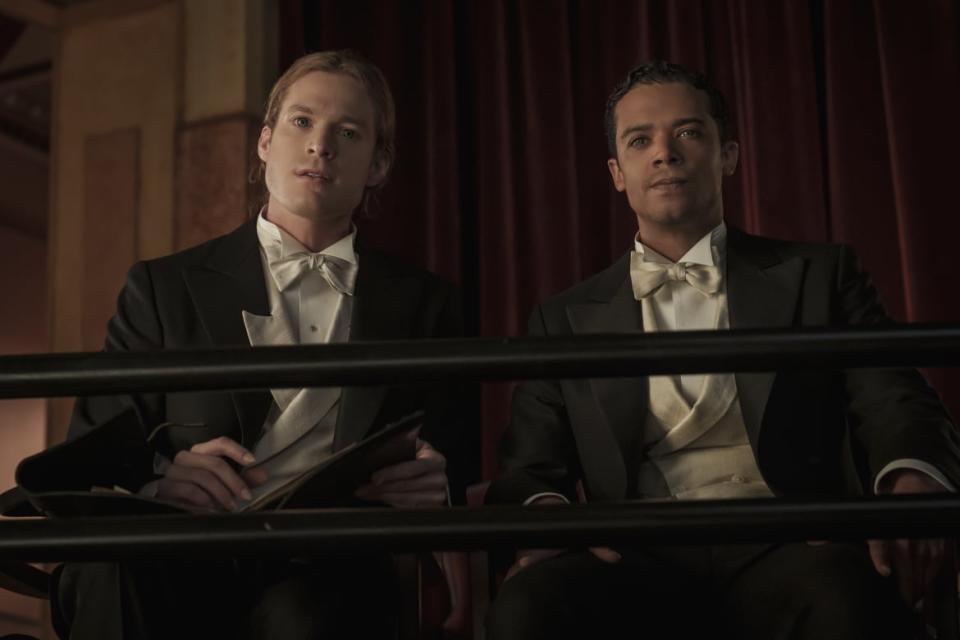The Super-Gay ‘Interview With the Vampire’ Series Is Badass, Gross, and So Sexy

This is a preview of our pop culture newsletter The Daily Beast’s Obsessed, written by senior editor Kevin Fallon. To receive the full newsletter in your inbox each week, sign up for it here.
In my world, it is a rule more sacred than a religious commandment that if anyone uses the phrase “Spooky Season” either to me or in my vicinity, they are excommunicated from my life and immediately reported to the police for their violent crime.
I’m not one to pleasure-shame. (Liking Hocus Pocus is not a personality.) Enjoy what you enjoy and make no apologies! (Your ranking of all the Nightmare on Elm Street movies is not interesting.) Good for you! (I’m sorry, you spent how much on a Halloween costume?)
OK, the hypocrisy is unfair. I am not proud of it. I do desperately want to encourage people to follow their bliss… but when that bliss leads them to the Target seasonal aisle to buy haunted house decorations in late August—you know who you are—I am tested. It is my desire to be inclusive and celebrate anyone who has found community through shared passions. But come near me with anything pumpkin spice-flavored and be ready for it to be thrown in your face like one of those slushies on Glee.
This extreme displeasure is especially unfortunate for someone who covers entertainment and, at this time of year, must steady himself for a deluge of his least favorite type of content. It’s only gotten worse in recent years, as streaming services have seized on “Spooky Season” (part of my soul just died writing that phrase again) as a branding opportunity. The onslaught of horror films and supernatural TV shows is exhausting. To be on theme: I would call it a nightmare.
So imagine my surprise to discover that one such new series, clearly timed to capitalize on Halloween interest, is among my favorite TV shows of the year so far. Anne Rice’s Interview With the Vampire is so, so good.
This is entirely unexpected, as TV adaptations of existing IP have largely become tedious and uninspired. That the 1994 movie version with Brad Pitt and Tom Cruise was garbage, aside from them being hot, certainly didn’t inspire confidence. The notion that there could be anything new, interesting, or modern to say about vampires—especially the Anne Rice characters that have been so thoroughly mined—is a creative gambit on par with asking for a miracle.

And yet, here we are. AMC’s Interview With the Vampire is lush and operatic. It is gross and disturbing, opening the dam for the sanguine river of blood to flow the way that a show like this should: so that it is as gorgeous as it is upsetting. There are provocative ideas about race and power dynamics filtered through the identity politics of bloodsuckers that, remarkably, work. A modern-day setting against a global pandemic should be irritating. Instead, it’s riveting.
Then there’s the thing that, in hindsight, makes it obvious that this show would win me over: They made it so gay.
If you’re an Anne Rice purist (it should come as no surprise that I am not), there are immediate changes you’ll notice and may have strong opinions about.
A reporter, Daniel Molloy (Eric Bogosian), is conducting the titular interview. In this case, it’s a re-interview; the first conversation was 50 years before, but was so filled with dishonesty and chaos that Molloy refers to it as a “fever dream told to an idiot.” This is his second chance to get an actual confession—the truth—from his subject.
That subject is Louis de Pointe du Lac, a vampire now living in the Emirates, who is recounting his time in New Orleans in 1910, where, as a mortal, he first met and made an unbreakable connection with Lestat de Lioncourt, the seductive French interloper who sinks his fangs into Louis. In the film, Louis was played by Pitt and Lestat by Cruise. Here, Jacob Anderson, best known as Game of Thrones’ Grey Worm, is Louis, which means that Louis is Black.

That adds nuance to Louis’ identity crisis in turn-of-the-century New Orleans: an upstanding Black man in a white-dominated, still racist South, who is already tortured by his sexual confusion and desire for unattainable upward mobility. It also complicates the power dynamic with Lestat (Sam Reid, who is white, doing the perfect vampiric dance between eerily enigmatic and irresistibly magnetic).
As Lestat entrances Louis, transforms him, and brings him into his world, questions are raised about how much of their connection is fated and how much agency Louis, given his race and the social norms at the time, really had.
Then there’s that most important—and most welcome—difference between this series and the film: Louis and Lestat fuck.
Anne Rice fans have *opinions* about the sexual dynamic between Pitt’s Louis and Cruise’s Lestat in the film. Was it erotic enough? Was it progressively queer-coded? Was it not queer at all? Was it offensively heterosexual? Here, on the other hand, there’s nothing up for interpretation. This is a romantic relationship, and these vampires are doing it.
That both is and isn’t the most consequential thing about this series. It lends context to Louis’ willingness to develop such an intense bond with Lestat so quickly. “For the first time in my life, I feel seen,” he says. That there’s an explicit carnal connection between them amplifies the intensity of the other extremes of their lifestyle: the hunting, the killing, the drinking of the blood. It also makes you better understand why things between them become so complicated as the series goes on.
In her piece on the series for Indiewire, Kristen Lopez wrote, “The relationship in the series is one of sex and, at times, love. But it’s also filled with trauma, manipulation, and other toxic elements.” Well if that’s not the most accurate description of a gay relationship, I don’t know what is.
Because of the sweeping scope of the series and the way it luxuriates in the gruesomeness, violence, and unsettling nature of vampiric life, it should apply that same swirl of seemingly conflicting tones to the sex: elegiac, yet feral; swooning, yet gruff; grounded, yet fantastical.
Julie Plec Puts Another Soapy Twist on the Vampire Genre With ‘Vampire Academy’
This Interview is also clever with its humor. It’s almost as if the series is winking at our decades-long relationship to these characters. Louis and Lestat’s queerness is taken seriously, but at the same time—and given how long so many fans waited for the sexuality to be so explicit—it has a sense of humor about the overtness of the gay sensuality, too.
The desire to be “drained,” for example, certainly carries a new connotation in this series. When Lestat converts Louis and brings him to his coffin for the first time, he cheekily tells him, “You can be on top.” And what greater subtext could there be to being in the closet than being in the coffin?
This Interview With the Vampire is as scary and as creepy as you “Halloween people” want it to be, as progressive as it needs to be, and as hottttttt as I want it to be. All that, plus it features the line of dialogue from Lestat that might explain life better than anything I have ever heard or read: “Every human thought boils down to three things: I want food; I want sex; I want to go home.”
Keep obsessing! Sign up for the Daily Beast’s Obsessed newsletter and follow us on Facebook, Twitter, Instagram and TikTok.
Get the Daily Beast's biggest scoops and scandals delivered right to your inbox. Sign up now.
Stay informed and gain unlimited access to the Daily Beast's unmatched reporting. Subscribe now.

 Yahoo News
Yahoo News 
